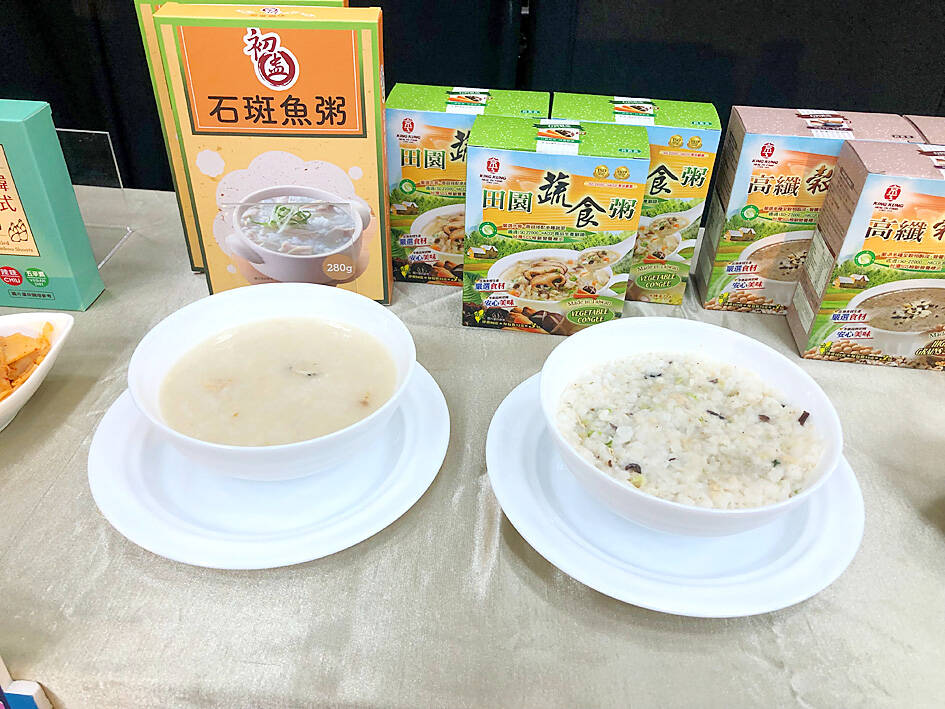Sales of emergency rations have been on the rise, as public interest in emergency preparedness has increased, an official said on Sunday.
Deputy Minister of Agriculture Hu Jong-i (胡忠一), who has long promoted the purchase of emergency rations, said that local companies have introduced more than 50 types of ration products, which include ready-to-eat meals, rice dishes and shelf-stable instant soups, he said.
Hu urged the public to prioritize buying rations made from locally grown agricultural products, which are better suited to Taiwan’s hot climate.

Photo: Yang Yuan-ting, Taipei Times
Since 2021, the Agriculture and Food Agency has been encouraging domestic manufacturers to use locally grown products in the production of emergency and disaster-preparedness foods.
Hu, who used the head the agency, said that the decision to promote this initiative was influenced by both the COVID-19 pandemic and his years of experience in Japan.
“During the pandemic, people tended to cook at home, but many were limited by their rental housing conditions, such as a lack of kitchen facilities or an inability to cook,” he said.
While living in Japan, Hu said he observed that Japanese households had a strong awareness of disaster preparedness.
Local governments in Japan would even remind foreign residents to stock at least seven days’ worth of emergency food, he said.
After securing special funding from the Executive Yuan, he decided to launch a competition to attract manufacturers in Taiwan to develop such products.
“In the event of a disaster, water and power supplies might be cut off and transportation disrupted. Therefore, these foods must be shelf-stable and ready to eat as soon as they are opened,” Hu said.
Given the hot weather in Taiwan, plain noodles or rice might be too dry and difficult to consume, so he encouraged the development of ready-to-eat soups and similar items, he said.
Beyond preservation concerns, Hu said he also hoped that emergency foods would meet taste standards.
To this end, the agency partnered with the Food Industry Research and Development Institute to evaluate and select products that could be commercialized and penetrate the market.
Awards were given to the selected companies, which could only claim the second half of their prize money if their products make it to store shelves, Hu said.
Since the selected foods taste good and are easy to store, they have become popular not just as emergency rations, but also as occasional meal choices for small households and singles, he said, adding that sales have increased annually.
Many supermarkets and convenience store chains, seeing the positive market response, have set up dedicated sections for emergency foods and have been adding related products to their shelves.
Recently, many manufacturers have reported a surge in orders, he said.
“Taiwan, like Japan, often faces threats from earthquakes and typhoons. It is absolutely necessary for households and individuals to keep emergency food supplies on hand,” he said.
The Ministry of Agriculture would also encourage the development of shelf-stable ready-to-eat products made from locally sourced livestock and seafood to give consumers more options, he said.

Costa Rica sent a group of intelligence officials to Taiwan for a short-term training program, the first time the Central American country has done so since the countries ended official diplomatic relations in 2007, a Costa Rican media outlet reported last week. Five officials from the Costa Rican Directorate of Intelligence and Security last month spent 23 days in Taipei undergoing a series of training sessions focused on national security, La Nacion reported on Friday, quoting unnamed sources. The Costa Rican government has not confirmed the report. The Chinese embassy in Costa Rica protested the news, saying in a statement issued the same

Taiwan’s Liu Ming-i, right, who also goes by the name Ray Liu, poses with a Chinese Taipei flag after winning the gold medal in the men’s physique 170cm competition at the International Fitness and Bodybuilding Federation Asian Championship in Ajman, United Arab Emirates, yesterday.

A year-long renovation of Taipei’s Bangka Park (艋舺公園) began yesterday, as city workers fenced off the site and cleared out belongings left by homeless residents who had been living there. Despite protests from displaced residents, a city official defended the government’s relocation efforts, saying transitional housing has been offered. The renovation of the park in Taipei’s Wanhua District (萬華), near Longshan Temple (龍山寺), began at 9am yesterday, as about 20 homeless people packed their belongings and left after being asked to move by city personnel. Among them was a 90-year-old woman surnamed Wang (王), who last week said that she had no plans

TO BE APPEALED: The environment ministry said coal reduction goals had to be reached within two months, which was against the principle of legitimate expectation The Taipei High Administrative Court on Thursday ruled in favor of the Taichung Environmental Protection Bureau in its administrative litigation against the Ministry of Environment for the rescission of a NT$18 million fine (US$609,570) imposed by the bureau on the Taichung Power Plant in 2019 for alleged excess coal power generation. The bureau in November 2019 revised what it said was a “slip of the pen” in the text of the operating permit granted to the plant — which is run by Taiwan Power Co (Taipower) — in October 2017. The permit originally read: “reduce coal use by 40 percent from Jan.